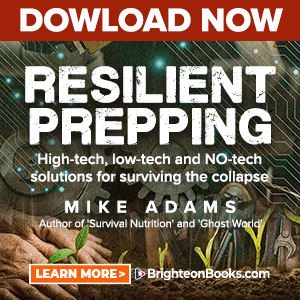
Keep calm: Risk of heart attack rises in hours after angry outburst
Wednesday, March 05, 2014 by: J. D. Heyes
Tags: health news, Natural News, nutrition
- Aerosolized bioweapons? Strange “diploid biomasses” falling out of the sky in Florida captured under the microscope
- Newly released JFK files reveal Pentagon's role in creating Lyme disease and covid in the same lab
- European Court of Justice: Healthcare professionals who promoted or administered COVID-19 vaccines are CRIMINALLY LIABLE for any harm caused
- German researchers find link between mRNA vaccines and GENETIC CHANGES that precede CANCER and AUTOIMMUNE DISORDERS
- “Project Aldrin”: Senate probes Meta's alleged censorship dealings with China
- Dr. Mary Talley Bowden drops bombshells about children being permanently damaged by mRNA jabs during Tucker Carlson interview
- When antibiotics are unavailable, natural ANTIMICROBIAL compounds become essential first line defenses against infection
- FBI imposed gag order on agents to silence Hunter Biden laptop truth before 2020 election, new chat logs reveal
- The dark legacy of the U.S. government’s UNETHICAL medical and military research
- NASA, State Dept. admit to renaming DEI programs to dodge Trump's ban in undercover sting
- “The Message of the Sphinx”: Did a lost civilization build the Giza monuments?
- DEATH by 12 VACCINES SIMULTANEOUSLY: Doctor playing catch-up on jabs injects 1-year-old baby with massive combination of dirty vax cocktails
- Analysis: The coming economic collapse, a mass uprising and Trump's three secret weapons to halt the growing revolt
- COVID mRNA injections linked to genetic changes that increase brain tumor and leukemia risk
- Exclusive: Microscopic analysis suggests unknown biological contaminants falling from the sky
- “Ghibli effect” sends ChatGPT usage soaring - but at what cost?
- Astaxanthin: Nature’s ultimate antioxidant powerhouse
- After Jenny McCarthy's son got AUTISM FROM MMR VACCINE, a PR Firm was hired by U.S. government agency to label her an "ANTI-VACCINE KOOK"
- Newly released JFK files reveal Pentagon's role in creating Lyme disease and covid in the same lab
- Oncologist warns of ‘terrifyingly aggressive’ cancers in children, linked to immune suppression from COVID vaccines
- Kiss Your Genetic Privacy Good-Bye! 23andMe Gets Green Light to Sell Your Intimate Genetic Details to Anyone They Want
- European Court of Justice: Healthcare professionals who promoted or administered COVID-19 vaccines are CRIMINALLY LIABLE for any harm caused
- Analysis: The coming economic collapse, a mass uprising and Trump's three secret weapons to halt the growing revolt
- Woman contracts WORLD'S DEADLIEST VIRUS after unknowingly being given the WRONG VACCINE
- Sugar-free deception: Artificial sweeteners hijack hunger signals, fuel obesity epidemic, study warns
- NIH study, buried for decades, reveals that Flu Shots INCREASE elderly deaths, not prevent them
- Britain’s descent into police state censorship: Parents raided for questioning their daughter’s school system online
- AI weather model outperforms traditional forecasts, boosts accuracy by 20%
- Aerosolized bioweapons? Strange “diploid biomasses” falling out of the sky in Florida captured under the microscope
- DARPA: The shadowy innovator behind the world’s most advanced military technologies
- The Health Ranger releases “Vaccine Zombie” song and music video, using AI-animated zombies for the music video
- Utah governor allows ban on LGBT pride flags in public buildings and schools, will take effect without his signature
- COVID-19 scandal linked to CANCER SURGE: Billionaire researcher sounds alarm
- Musk targets “strangely wealthy” lawmakers in DOGE probe, names Pelosi, McConnell, Schumer
- Dr. Suzanne Humphries makes bombshell appearance on Joe Rogan podcast, exposing vaccine industry deception back to POLIOMYELITIS
- Ancient kitchen secrets REVEALED: How garlic, ginger and green onions fight cancer and heart disease
- Newly released JFK files reveal Pentagon's role in creating Lyme disease and covid in the same lab
- California's social media censorship law struck down: A victory for free speech or a threat to online safety?
- EPA advisor admits the agency is funneling billions to climate groups ahead of Trump’s return to White House
- Dr. Mike Yeadon releases 15-minute testimony - WATCH - about genocidal intent of COVID “vaccines”
- The Health Ranger releases “Vaccine Zombie” song and music video, using AI-animated zombies for the music video
- Florida takes a stand: DeSantis proposes permanent ban on mRNA vaccine mandates
- Rep. Nancy Mace introduces bill to ban biological males from female facilities on federal property
- Mike Adams releases country western hit single: Goin’ Back in Time is Comin’ Home
- Sugarcane extract superior to cholesterol-lowering drugs?
- Survival 101: Effective EMF blocking techniques
- “Why we influenced the 2020 elections”: Facebook files reveal the coordinated effort to bury the Hunter Biden laptop story
- Unpacking the Lies That We’ve Been Fed – new song and music video released by Mike Adams, the Health Ranger
- House Intelligence Committee calls for the ARREST and PROSECUTION of Dr. Anthony Fauci
- The pandemic as a tool for INDOCTRINATION: Understanding “The Indoctrinated Brain” by Dr. Michael Nehls
- Mike Adams releases music poetry sensation: A Child of God
- OpenAI whistleblower who dissented against how the company trained ChatGPT found dead
- Attorney and TikTok influencer explains how he was offered hundreds of dollars to make false claims about Trump, Republicans
- CONSERVATIVES SOUND THE ALARM: Big Pharma and the Left trying to force $32 billion money grab from America’s seniors into year-end spending deal
- Red Cross issues warning to stop blood plasma donations from vaccinated people
- Scientists confirm: GENIUS brain function can be spontaneously unleashed in humans without any apparent cause
- EPA advisor admits the agency is funneling billions to climate groups ahead of Trump’s return to White House
- HYSSOP: What research reveals about the health benefits of this ancient holy herb
- Two containers with completed ballots fall out of truck in Florida
- Fully vaccinated about to see “tsunami” of illness and death, warns virologist
- Global leaders unite to clamp down on “misinformation” with UN-backed Cascais Declaration
- BREAKING: 2025 NDAA authorizes mandatory military draft of WOMEN across America… as Pentagon pursues global NUCLEAR war with both Russia and China at the same time
- Michael Yon warns of a ZIONIST TAKEOVER in Trump’s second administration
- Ozempic and Wegovy weight loss drugs are injectable LIZARD VENOM PEPTIDES that may unleash a devastating wave of organ failure… side effects align with symptoms of SNAKE BITES
- BOMBSHELL: DNA testing kits are a SCAM to develop ethnic-specific bioweapons
- Newly released JFK files reveal Pentagon's role in creating Lyme disease and covid in the same lab
- Israeli soldiers accused of even more torture and abuse in the West Bank
- These 13 countries just signed an agreement to engineer a global FAMINE by destroying food supply
- NASA admits that climate change occurs because of changes in Earth’s solar orbit, and NOT because of SUVs and fossil fuels
- The Health Ranger releases “Vaccine Zombie” song and music video, using AI-animated zombies for the music video
- RFK Jr. clears key hurdle: Sen. Susan Collins backs controversial HHS nominee, signaling a new era for health policy
- Sermon 30: How Jesus reveals Caesar’s FAKE CURRENCY and FALSE AUTHORITY
Researchers were quick to add that the absolute risks to any one person of having heart problems following a single outburst remain low. But, following a review of multiple studies, researchers determined that the risk did, in fact, rise considerably when compared to periods of calm.
"It is not surprising that such an association is seen since we know that anger is associated with increased reaction of the body's nervous system to stress," one expert, Dr. Sripal Bangalore, associate professor of medicine at NYU Langone Medical Center in New York City, told HealthDay News.
The unhealthy reaction includes "increases in heart rate and blood pressure -- both of which can have immediate adverse consequences," Bangalore, who was not involved in the study, said.
Researchers performed a meta-analysis of nine studies that were conducted between 1966 and 2013, which included more than 4,500 cases of heart attacks, 462 cases of acute coronary syndrome (a catch-all term that includes chest pain and heart attack), in excess of 800 stroke cases and more than 300 cases of heart arrhythmia. As reported by HealthDay News, the researchers found:
Within two hours of an angry outburst, a person's risk of heart attack or acute coronary syndrome increased nearly five-fold, their risk of stroke rose nearly four-fold and their risk of a dangerous heart rhythm disorder called ventricular arrhythmia also rose.
Underlying factors increase your risk
Scientists evaluating the studies said they found that the risk was highest among those who became angry more often and had existing risk factors like prior heart problems. The findings were published online March 3 in the European Heart Journal.
Elizabeth Mostofsky, an instructor at the Harvard School of Public Health who led the study, said that, because angry outbursts are pretty rare and the effects appear to be transient, "the impact on an individual's absolute risk of a cardiovascular event is small."
"Although the risk of experiencing an acute [heart] event with any single outburst of anger is relatively low, the risk can accumulate for people with frequent episodes of anger," she said. "This is particularly important for people who have higher risk due to other underlying risk factors or those who have already had a heart attack, stroke or diabetes.
"For example, a person without many risk factors for [heart] disease who has only one episode of anger per month has a very small additional risk, but a person with multiple risk factors or a history of heart attack or stroke, and who is frequently angry, has a much higher absolute excess risk accumulated over time," she continued.
Don't let it get to the point of an outburst
Granted, some situations get out of control before you know it, but some experts say the best way to avoid risking your health is to never let it get to the point that you have to lash out.
"Often an angry outburst is the result of pushing emotions down for a while," said Beth Burgess, a Dialectical Behavior Therapist, specializing in anxiety and stress, and founder of Sort My Life Solutions (Smyls).
"If you suddenly lose your rag at someone, it's more than likely not the first time they have angered you," she told Natural News in an email. "It's the straw that broke the camel's back, so to speak. If someone is doing something you don't like, address it the first time it upsets you, rather than enduring the problem silently and exploding when you can't take any more."
Prof. Joshua Klapow, a licensed clinical psychologist and associate professor of public health at the University of Alabama at Birmingham, agrees.
"Very often people don't recognize most early signs of increasing anger. As a result they allow anger levels to rise too high to control on their own," he told Natural News.
Other experts say the best way to keep your stress levels down is through regular physical exercise.
"My favorite way to exercise is to take exercise classes because they work on a multitude of levels - they produce endorphins and they're social," Dr. Lauren Napolitano, Psy.D., a psychologist at Bryn Mawr Hospital in Pennsylvania, told me. "Distracting yourself when you're stressed is a great way to put your problems in perspective."
Dr. Isaiah B. Pickens, a licensed clinical psychologist in New Jersey and founder of iOpeningEnterprises, says one way to keep stress at bay is to keep good company.
"Connect with the right people," he told Natural News. "As social beings, few other natural strategies are as effective at reducing stress as spending time with people we care about and who care about us."
Sources:
http://www.philly.com
http://www.hsph.harvard.edu
http://www.iopeningenterprises.com
http://laurennapolitanopsyd.com
http://www.bethburgess.co.uk
http://science.naturalnews.com
Health news at FETCH.news
Get independent news alerts on natural cures, food lab tests, cannabis medicine, science, robotics, drones, privacy and more.
Take Action: Support Natural News by linking to this article from your website
Permalink to this article:
Embed article link: (copy HTML code below):
Reprinting this article:
Non-commercial use OK, cite NaturalNews.com with clickable link.
Follow Natural News on Facebook, Twitter, Google Plus, and Pinterest
Science News & Studies
Medicine News and Information
Food News & Studies
Health News & Studies
Herbs News & Information
Pollution News & Studies
Cancer News & Studies
Climate News & Studies
Survival News & Information
Gear News & Information
News covering technology, stocks, hackers, and more



"Big Tech and mainstream media are constantly trying to silence the independent voices that dare to bring you the truth about toxic food ingredients, dangerous medications and the failed, fraudulent science of the profit-driven medical establishment.
Email is one of the best ways to make sure you stay informed, without the censorship of the tech giants (Google, Apple, Facebook, Twitter, YouTube, etc.). Stay informed and you'll even likely learn information that may help save your own life."
–The Health Ranger, Mike Adams













































